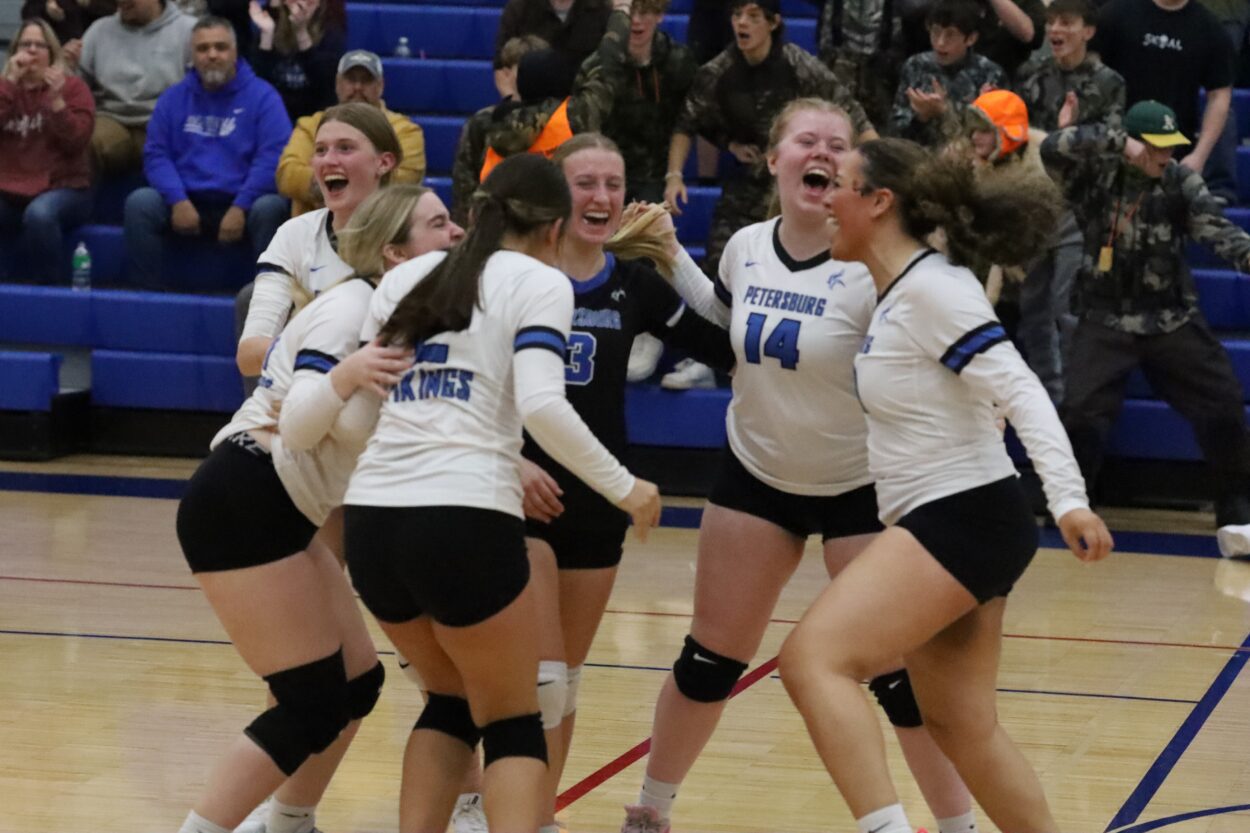
Listen here:
Jaime Cabral is obsessed with getting students involved in activities.
“My ultimate goal is to try and have 100% participation,” he said. “One day we’re going to get there. We’re close.”
He’s the activities director for the Petersburg middle and high schools. He says he’s always trying to find undiscovered skills or passions. Like last year, when he was taken aback by one student’s voice while watching the school’s musical.
“I go, ‘You need to be in choir — like, you need to be in choir,’” he said. “And then they were performing at Southeast honors music this past fall.”
Cabral says extracurricular involvement is just so good for kids. And studies back that up. Not only are students less likely to drop out of school when they get involved in activities, they have higher GPAs and do better on standardized tests. They also tend to have a higher sense of self worth, be less likely to drink or use drugs, have fewer discipline problems, and have more friends.
Cabral says sometimes an afterschool activity is the most consistent, dependable thing in a kid’s life — or the first time they’ve had someone explicitly believe in them over and over and over. Cabral says even a grade check can be an act of encouragement — students aren’t allowed to participate in activities if they have any D’s or F’s. But he says often it’s less about hounding the kids, and more about encouraging them.
“Constantly checking in with them every week, like, ‘Awesome job!’ just so that they hear that, and they know that it’s appreciated,” he said.
Driving is out
But travel in Southeast Alaska isn’t straightforward, so when activities involve other schools, things can get dicey. Most towns are on islands, so driving is out. Ferries are far and few between these days. Kids often fly, but that’s a crapshoot in rainy Southeast, where low clouds can keep planes from landing.
Take, for example, a recent volleyball conference in Petersburg: One team made their reservations for the wrong day — Cabral shuffled the schedule to fit their games in. Then heavy cloud cover kept a plane from landing in Hoonah, so the team missed their connection — once again, new schedule. Wrangell was slated to come over by boat, but the forecast called for high seas. Cabral brought them over a day early to beat the weather. But then he had to find them a place to stay — and rewrite the schedule yet again. By the time all the teams arrived, he’d revised the schedule five times.
Cabral does the same thing for band and choir, for wrestling and basketball and baseball, for e-sports and Native Youth Olympics.
“It is hard to understand how sometimes he doesn’t like, burst,” said Elizabeth Burns, a senior on the volleyball team. “If he has a bad day, he definitely doesn’t show it.”
‘Failure is baked in’
Cabral is also Petersburg’s volleyball coach. His players got off to a rocky start this season. They’re a relatively inexperienced team. At an earlier conference, they lost all but one match.
But Wrangell’s coach, Brian Herman, says that with volleyball, failure is baked in.
“When three people have to touch the ball before it comes over the net,” he said, “Pretty good chance somebody’s gonna make a mistake.”
He says part of his job as a coach is to help keep the players in a positive mindset.
“You know when they’re in it because they’ll make a mistake, and they’ll have a smile on their face,” he said. “Then we know that we’ve got them right where we want them, and that they’re going to be successful.”
And he says he often sees that positive mindset follows students off the court.
“It’s fun to see them gain that confidence and then actually follow through with that in life,” Herman said.
‘We knew that we could push through’
At the volleyball conference in Petersburg, things came together for the Vikings. After losing their first match to their longtime rivals, the Wrangell Wolves, they won three of their next four.
Feeling good, Cabral gathered the team in his office.
“You guys served tough that game. And you guys communicated well, and you guys communicated on defense,” he said. “Super proud of you guys on that one, awesome.”
All weekend, coaches and players have been talking about communication — they need to be clear about who’s going to hit the ball, what’s going on on the court. After Cabral’s pep talk, Durgan-Ware says she’s learning that there’s more to it than that — and it goes beyond volleyball.
“With communication also comes listening, trusting what they have to say and actually taking it in,” she said. “I’ve seen teams this tournament where they are constantly talking, but nobody is listening.”
In the final match, the Vikings played the Haines Glacier Bears. The Vikings were already warmed up, cheeks flushed from just beating Hoonah.
Each match is the best of three games. The Glacier Bears easily won the first. They were up in the second, too, until they weren’t. Something shifted — the Vikings were focused. They won by seven.
When the Vikings won the third and final game, they went wild, giddy and laughing. They’ve just won five out of seven matches, after losing all but one earlier this year.
Durgan-Ware said a lot of her team’s turnaround came from determination.
“We knew that we could push through,” she said. “It takes a lot of recognition of how important it is to lift up your teammates and allow yourself to be lifted up by your teammates.”
She said the team does that in a lot of different ways. During the tournament each player got a poster filled with anonymous encouragement and compliments from her teammates.
“It’s going up on my wall,” Durgan-Ware said. “And it’s never coming down.”
This story is part of CoastAlaska’s new series, “Evolving Education.” You can find the other stories here.











